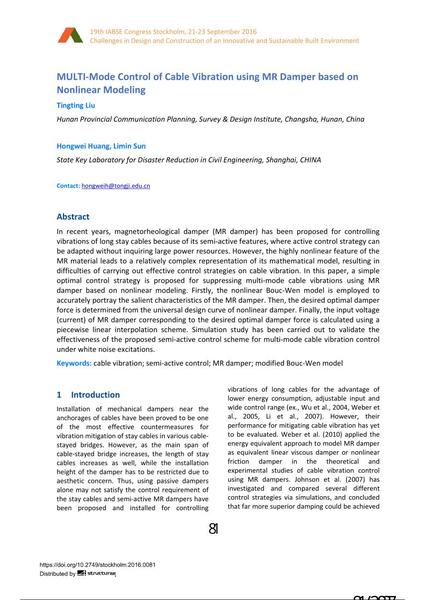MULTI-Mode Control of Cable Vibration using MR Damper based on Nonlinear Modeling

|
|
|||||||||||
Détails bibliographiques
| Auteur(s): |
Hongwei Huang
(State Key Laboratory for Disaster Reduction in Civil Engineering, Shanghai, China)
Tingting Liu (Hunan Provincial Communication Planning, Survey & Design Institute, Changsha, Hunan, China) Limin Sun |
||||
|---|---|---|---|---|---|
| Médium: | papier de conférence | ||||
| Langue(s): | anglais | ||||
| Conférence: | IABSE Congress: Challenges in Design and Construction of an Innovative and Sustainable Built Environment, Stockholm, Sweden, 21-23 September 2016 | ||||
| Publié dans: | IABSE Congress Stockholm, 2016 | ||||
|
|||||
| Page(s): | 81-88 | ||||
| Nombre total de pages (du PDF): | 8 | ||||
| Année: | 2016 | ||||
| DOI: | 10.2749/stockholm.2016.0081 | ||||
| Abstrait: |
In recent years, magnetorheological damper (MR damper) has been proposed for controlling vibrations of long stay cables because of its semi-active features, where active control strategy can be adapted without inquiring large power resources. However, the highly nonlinear feature of the MR material leads to a relatively complex representation of its mathematical model, resulting in difficulties of carrying out effective control strategies on cable vibration. In this paper, a simple optimal control strategy is proposed for suppressing multi-mode cable vibrations using MR damper based on nonlinear modeling. Firstly, the nonlinear Bouc-Wen model is employed to accurately portray the salient characteristics of the MR damper. Then, the desired optimal damper force is determined from the universal design curve of nonlinear damper. Finally, the input voltage (current) of MR damper corresponding to the desired optimal damper force is calculated using a piecewise linear interpolation scheme. Simulation study has been carried out to validate the effectiveness of the proposed semi-active control scheme for multi-mode cable vibration control under white noise excitations. |
||||
